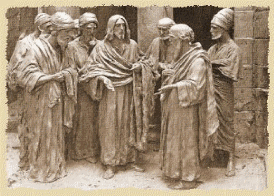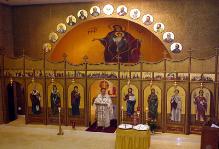 |
||||||
 |
||||||
|
|
||
 |
||||
 |
||||
Ministers are individuals who are duly ordained, commissioned, or licensed by a religious body constituting a church or church denomination. They are given the authority to conduct religious worship, perform sacerdotal functions, and administer ordinances or sacraments according to the prescribed tenets and practices of that church or denomination. IRS Publication 517
In light of Tax Court rulings of the mid 1990’s the Greek Orthodox Archdiocese of America took the position on January 1, 2001 that clergy of the Archdiocese are ‘employees’ for federal and state/local tax purposes. Clergy serving the Archdiocese are not independent contractors that can come and go as they please, make their own agreements with parishes, furnish equipment for the ‘job,’ provide and pay for people to take their place, etc. The Archdiocese is the ‘employer’ and the parish the payer/agent for compensation purposes. The parish also files the appropriate tax forms. As a result a clergyman of the Archdiocese would receive a Form W-2, not a Form 1099 (which someone self-employed would receive).
Tax Advantages of a W-2 versus a 1099 Audit less likely. The likelihood of being audited increases dramatically if receiving a few 1099s and filing a Schedule C. Once audited it would likely be determined that one's status is not that of being self-employed and then penalties and interest would come into the calculations not to mention the inordinate amount of time spent reconstructing tax records for the audit.
Tax Disadvantages of a W-2 versus a 1099 Interest paid on a car loan used for business is not deductible when using a W-2. Lease payments, however, are deductible on both. Business expenses are deductible on Form 2106 and listed on Schedule A, but only if they exceed 2% of Adjusted Gross Income. On Schedule C (Form 1099, Self-Employed), all expenses are deductible. Honorariums are listed on Schedule C (requiring an additional form to complete).
Payroll Withholding By law clergy are not subject to the mandatory withholding of federal, state or local income taxes from their remuneration checks. They can, however, choose to have withholding take place to avoid the necessity of filing quarterly estimated tax payments (due April 15, June 15, September 15 and January 15). If a clergyman chooses to have withholding take place, it is important to note that social security and medicare taxes can never be withheld as a clergyman is ALWAYS considered self-employed for Social Security tax purposes. As a result, they should calculate the amount anticipated for these taxes and add that amount to their federal tax withholding. If withholding does not take place then timely quarterly estimated tax payments are required to be made. Underpayments, whether taxes are withheld or paid quarterly, result in severe penalties and interest. One exception to these penalties is when someone pays as his estimated tax payment for the following tax year the total tax liability (100%) he had for the year before. A disadvantage to this is that if your liability is significantly more than the year before you will need to pay this added amount by April 15th. There will not normally be any penalties or interest levied however. In the event that one’s adjusted gross income is over $150,000 ($75,000 if married and filing separately), then the estimated tax needs to be at least 110% of the prior year’s tax liability to avoid a penalty for underpayment.
Health Insurance Payments Paid by a Parish Payments made by a parish for health insurance premiums for an employer (Archdiocese) sponsored group plan are not taxable income.
|
||
© 2017 by Fr. Michael T. Kontogiorgis |
||||